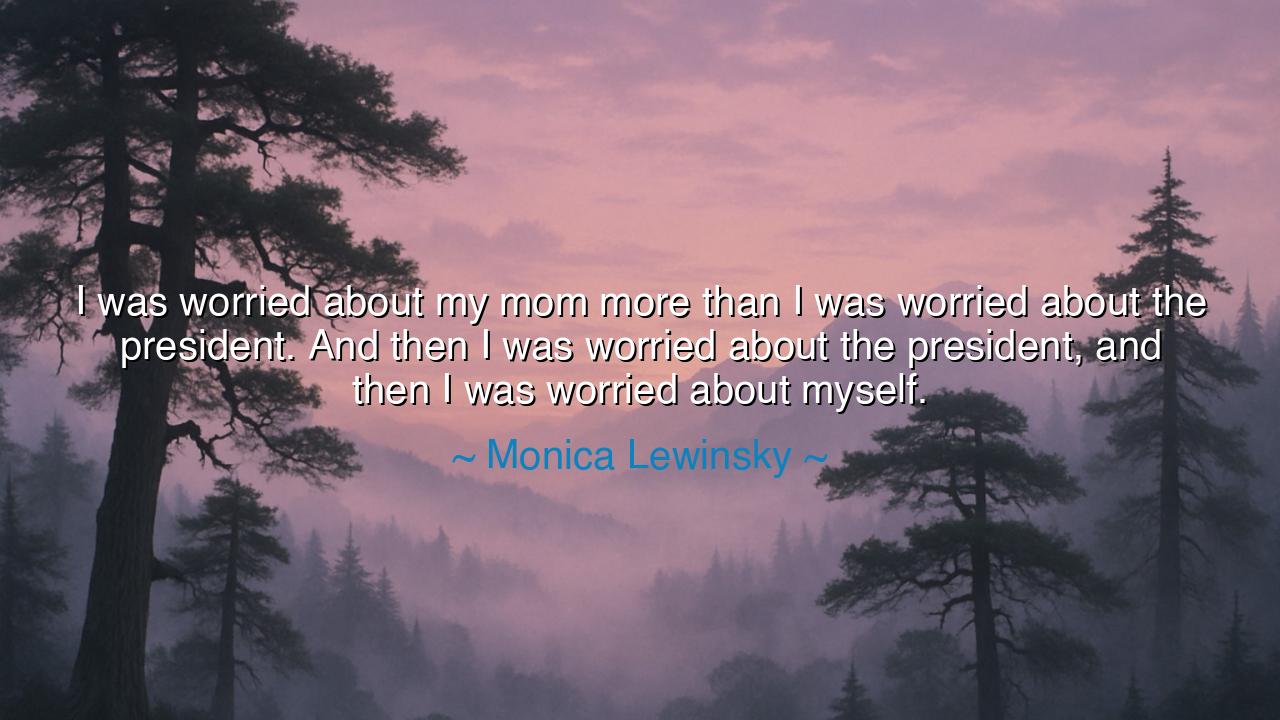
I was worried about my mom more than I was worried about the
I was worried about my mom more than I was worried about the president. And then I was worried about the president, and then I was worried about myself.






Hearken, children of reflection, to the words of Monica Lewinsky, who confesses: "I was worried about my mom more than I was worried about the president. And then I was worried about the president, and then I was worried about myself." In these words lies a profound meditation on the hierarchy of human concern, the natural progression of our care from those we hold nearest, to the broader spheres we inhabit, and ultimately, to the self. The ancients knew well that fear and anxiety are often the teachers of perspective, revealing where the heart’s attachments truly reside.
Since time immemorial, the bonds between child and parent have been recognized as among the most sacred and immediate of human ties. Cicero wrote that the care of family is both duty and devotion, and that the love for a parent is the wellspring from which empathy for the wider world flows. Lewinsky’s initial worry for her mom reflects this eternal truth: in the face of scandal, danger, or uncertainty, the mind first turns to the safety and dignity of those we love most intimately.
Yet as the ancients also knew, human concern expands outward, shaped by context and circumstance. Lewinsky’s shifting focus—from her mom, to the president, and finally to herself—mirrors the natural unfolding of awareness. In times of crisis, individuals often move from private, intimate attachments to larger social or political considerations, and eventually must confront their own survival, integrity, and inner turmoil. The progression of worry is thus a reflection of the expanding field of responsibility, from the personal to the public, and back again to the personal in its fullest reckoning.
Consider the life of Socrates, who, in the face of trial and accusation, was deeply concerned for the preservation of his students’ moral education, for the stability of Athens, and finally for his own soul and adherence to virtue. In a similar way, Lewinsky’s words reflect the human struggle to navigate multiple realms of consequence, balancing concern for loved ones, for the structures of power, and for oneself. It is in this tension that character is forged, and wisdom may be glimpsed.
The quote also highlights a subtle truth about fear and responsibility: to care is to recognize stakes, to witness the fragility of those we love, and to confront our own vulnerability. Lewinsky’s worry is not weakness; it is evidence of moral and emotional consciousness. The ancients understood that such concern, when processed with reflection and courage, becomes a source of learning, empathy, and ultimately resilience. The order of her worries teaches us that human concern is layered, each layer providing insight into priorities, values, and relational bonds.
From this reflection, a timeless lesson emerges: our attention and care reveal the architecture of the soul. We first protect those closest to us, then the society or systems in which we participate, and finally ourselves, for the cultivation of the self is essential to sustaining all other forms of care. In understanding this, we cultivate both empathy and self-awareness, recognizing that worry is a natural compass pointing toward what we value most deeply.
Practical actions follow naturally. In moments of uncertainty or crisis, take stock of your concerns, tracing their origins and significance. Attend first to those who depend upon you intimately, extend consideration to the broader responsibilities you hold, and ensure that your own well-being is neither neglected nor diminished. Reflect upon the layers of worry as guides to understanding your priorities and values, and let this reflection inform measured, thoughtful action.
Remember, children of the ages, that the path of human concern winds from the heart to the world and back to the self. Monica Lewinsky’s words illuminate the natural unfolding of care, revealing the sacred bonds between family, society, and individual integrity. In attending to these layers with honesty and courage, we honor the eternal rhythm of human responsibility, learning to navigate the storms of life with wisdom, empathy, and balance.






AAdministratorAdministrator
Welcome, honored guests. Please leave a comment, we will respond soon